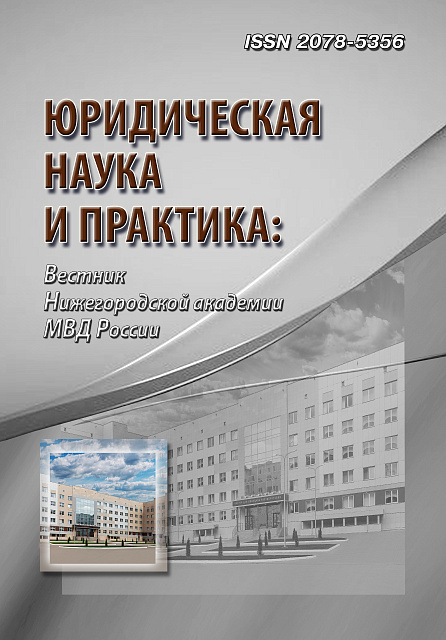Volga-Vyatsky branch of Moscow Technical University of Communications and Informatics
Russian Federation
The article reveals the organizational and legal foundations in the activities of the police to ensure public charity in the period of the XVIII–XIX centuries. The evolution of the formation of the legal foundations that determine the material and financial support in the organization of the mechanism for the implementation of the charity policy is considered. A diverse picture of police activity in the implementation of areas of public charity, features in the implementation of forms of assistance declared by the state, as well as the evolution of methods and directions in police activities is traced. The article analyzes the role of the police, one of the main administrative and executive authorities in the Russian Empire in the development and implementation of the idea of public charity and its traditions, especially in providing supervisory and control functions in organizing assistance to those in need.
Russian Empire, public opinion, police, legislation, begging
1. Tsypin V. A. Church law. Moscow, 1996. (In Russ.)
2. Karamzin N. M. History of the Russian state. Book 1. Vol. 1. Moscow, 1988. (In Russ.)
3. Klyuchevsky V. O. Good people of Ancient Rus’. Theological Bulletin, Sergiev Posad, 1892. (In Russ.)
4. Points to the general police master from May 25, 1718. Complete collection of laws of the Russian Empire. Collection I. Vol. V. No. 3212. (In Russ.)
5. Wolf S. P. Charitable legislation in the Russian Empire: a stumbling block or a solid foundation for the development of charity. Bulletin of the Siberian Institute of Business and Information Technology, 2016, no. 1 (17), pp. 9–100. (In Russ.)
6. On the seizure of beggars pretending to be disabled and their punishment: Personal decree of November 30, 1691. Complete Collection of Laws of the Russian Empire (hereinafter PSZ). Collection 1. Saint Petersburg, 1830. No. 1424. Pp. 119–120. (In Russ.)
7. On the prohibition of the disabled from going to St. Petersburg to beg for alms: Senate decree of October 13, 1718. PSZ. Collection 1. T. V. No. 10824. Pp. 189–190. (In Russ.)
8. Galay Yu. G. Legislative measures of Peter the Great to eradicate beggary. Bulletin of the N. I. Lobachevsky University of Nizhny Novgorod, 2007, no. 1, pp. 236–239. (In Russ.)
9. On the capture of beggars and their sending back to their former places after punishment: decree of June 20, 1718. PSZ. Collection 1. Vol. V. No. 3213. Pp. 578–579. (In Russ.)
10. Sizikov M. I. General police in Russia in the 18th century. Moscow, 1999. (In Russ.)
11. Institutions for the governance of the provinces of the All-Russian Empire of November 7, 1775. PSZRI–I, Vol. XX. No. 14392. (In Russ.)
12. Charter on public charity. Code of laws of the Russian Empire. Vol. XIII. Pg. 1915. (In Russ.)
13. On measures to provide food to the poor: decree. PSZRI-I. Vol. XX (1775–1780). № 15152. (In Russ.)
14. Tarasova I. A. The role of the police in ensuring charitable activities in pre-revolutionary Russia (18th - early 20th centuries): historical and legal aspect. Author’s abstract... candidate of legal sciences. Moscow, 2001. (In Russ.)
15. The Ministry of Internal Affairs of Russia 1802–2002. Historical essay in 2 volumes. St. Petersburg University of the Ministry of Internal Affairs of Russia; Academy of Law, Economics and Life Safety. 2002. (In Russ.)
16. Grivastova A. N. Charity in pre-revolutionary Russia: main problems and results of the study. Christian reading, 2022, no. 2, pp. 335–348. (In Russ.)
17. On the non-acceptance of donations from vicious people and non-rewarding them for them: decree of January 4, 1816. PSZRI-I. T. XXXIII. No. 26061. (In Russ.)
18. Kirpa M. S. Activities of the Ministry of Internal Affairs of the Russian Empire on Public Welfare Issues. Jurist-Pravoved: scientific-theoretical and information-methodical journal Rostov-on-Don, 2023, no. 2(105), pp. 125–130. (In Russ.)
19. Charter on Public Welfare of 1892. Code of Laws of the Russian Empire. T. XIII. St. Petersburg, 1892. (In Russ.)












